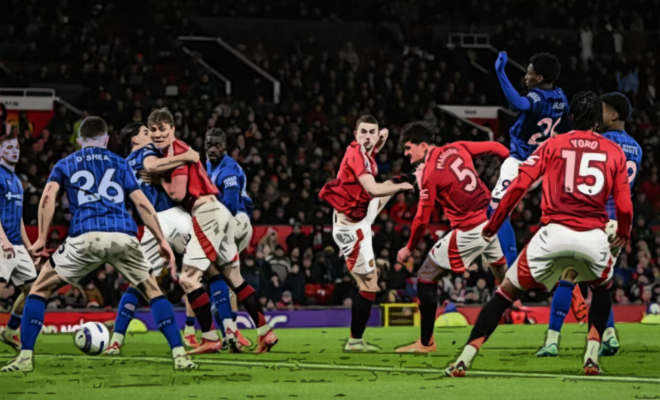Exploiting Full-Backs: Lessons for Arsenal from United’s Win Over Ipswich

In the relentless pursuit of tactical superiority, football’s modern game demands a multifaceted approach, where even the seemingly peripheral positions of full-backs have evolved into potent weapons of attack. For Arsenal, a team steeped in attacking tradition, unlocking the full potential of their full-backs is paramount to their aspirations of challenging for major honors. A recent, hard-fought 3-2 victory by Manchester United over Ipswich Town offers a compelling case study in how to effectively exploit full-backs, providing valuable lessons that the Gunners can assimilate into their own tactical framework.
Manchester United’s triumph over Ipswich was far from a straightforward affair; it was a game characterized by resilience, capitalizing on defensive lapses, and a focused exploitation of the opposition’s full-backs. United’s ability to orchestrate a first-half comeback and ruthlessly expose defensive vulnerabilities underscores the significance of a well-executed strategy targeting the flanks.
Capitalizing on Defensive Mix-Ups: United’s Early Advantage
Manchester United’s victory over Ipswich was forged on a foundation of capitalizing on defensive errors and executing swift counter-attacks. While defensive solidity is essential, the Red Devil’s win highlights the potency of exploiting defensive frailties, particularly those stemming from mix-ups and miscommunications within the opposition’s backline.
Ipswich gifted the opener after a terrible mix-up just four minutes in with Dorgu kicking the ball past Andre Onana, who had rushed off his line, leaving Philogene with the easiest of tap-ins at an empty net. United got a stroke of luck for the equaliser as Bruno Fernandes’ curling free-kick was headed into his own net by the unsuspecting Morsy.
Analyzing Manchester United’s Attacking Approach
To fully appreciate Manchester United’s approach to exploiting Ipswich’s full-backs, it’s vital to dissect their attacking setup and understand how each player contributed to the overall strategy. While specific formations and personnel may differ, the underlying principles remain consistent:
- Width and Penetration: Manchester United’s attacking play emphasized width, stretching the Ipswich defense and creating space for central midfielders and forwards to operate. Wingers hugged the touchlines, drawing out full-backs and creating opportunities for overlapping runs from United’s own defenders.
- Overlapping Runs: Full-backs consistently made overlapping runs beyond the wingers, providing an additional attacking outlet and forcing Ipswich’s defenders to make difficult decisions. These runs not only created numerical advantages in wide areas but also dragged defenders out of position, opening up gaps in the center of the defense.
- Precise Crossing: Manchester United’s attacking success hinged on the accuracy and quality of their crosses. Wingers and full-backs delivered pinpoint deliveries into the box, targeting specific areas and exploiting the aerial weaknesses of Ipswich’s defenders.
- Set-Piece Delivery: Fernandes continued to provide a threat from set-pieces.
- Maguire’s Goal: Maguire secured 10-man Manchester United a first Premier League win since January, edging Ipswich Town 3-2.
Lessons from the Nottingham Forest Game
To comprehend how Arsenal can translate Manchester United’s approach into their own game plan, it’s crucial to examine their attacking performance in a recent fixture against Nottingham Forest, a game where the Gunners were held to a frustrating 0-0 draw. By analyzing Arsenal’s attacking setup and contrasting it with Manchester United’s approach, we can identify key areas for improvement.
- Inability to Break Down Defenses: In the match against Nottingham Forest, Arsenal struggled to penetrate a well-organized defense, often finding themselves stifled in the final third. They lacked the width, movement, and incisiveness to unlock the opposition’s backline and create clear-cut scoring opportunities.
- Limited Full-Back Contribution: Arsenal’s full-backs often failed to make a significant impact in attack, lacking the overlapping runs, crossing ability, and tactical awareness to stretch the defense and create opportunities for teammates. Their reluctance to venture forward left Arsenal’s attack narrow and predictable.
- Lack of Creativity: Arsenal’s attacking play lacked the creative spark needed to break down Forest’s stubborn defense. They struggled to provide incisive passes, clever movement, and individual brilliance to carve out clear-cut scoring chances.
Arsenal’s Potential Attacking Evolution
Drawing inspiration from Manchester United’s victory over Ipswich, Arsenal can adopt several strategies to enhance the attacking contributions of their full-backs and unlock new dimensions in their offensive play:
- Encouraging Overlapping Runs: Arsenal’s manager should encourage full-backs to make more frequent overlapping runs beyond the wingers, providing an additional attacking outlet and forcing opposition defenders to make difficult decisions. These runs will not only create numerical advantages in wide areas but also drag defenders out of position, opening up gaps in the center of the defense.
- Improving Crossing Technique: Arsenal’s full-backs need to hone their crossing technique, developing the ability to deliver accurate, pinpoint deliveries into the box. They should practice crossing from various angles and distances, targeting specific areas and exploiting the aerial weaknesses of opposing defenders.
- Developing Tactical Awareness: Arsenal’s full-backs must develop a greater understanding of tactical positioning, knowing when to push forward, when to stay back, and how to coordinate their movements with teammates. They should study the movements of opposing wingers and full-backs, anticipating their runs and exploiting any defensive vulnerabilities.
- Defensive Confusion: Defensive confusion between Patrick Chinazaekpere Dorgu and Andre Onana presented Jaden Philogene with the simplest of finishes after just four minutes.
- Dorgu’s Red Card: Dorgu’s challenge on Omari Hutchinson was deemed worthy of a red card, a decision made with the intervention of the VAR.
- Ipswich Domination: Ipswich dominated possession and made some promising inroads through Philogene and Delap, while piling on the pressure, though they struggled to test Onana.
Arteta’s Tactical Adjustments
To implement these changes, manager Mikel Arteta may consider several tactical adjustments to maximize the attacking potential of his full-backs:
- Formation Tweaks: Arteta may experiment with different formations to provide greater attacking freedom for his full-backs, potentially deploying a 3-4-3 or a 4-3-3 with inverted wingers to create space for overlapping runs.
- Personnel Selection: Arteta should prioritize selecting full-backs with strong attacking attributes, such as pace, crossing ability, and tactical awareness. He may also consider converting wingers into full-backs to provide a greater attacking threat down the flanks.
- Targeted Training Drills: Arteta should implement targeted training drills to improve the full-backs’ ability to make overlapping runs, deliver accurate crosses, and coordinate their movements with teammates. These drills should focus on enhancing communication, coordination, and tactical understanding.
Potential Arsenal Lineup Changes
To fully realize the attacking potential of their full-backs, Arsenal may consider strategic changes to their lineup:
- Starting a More Attack-Minded Full-Back: Arsenal could benefit from starting a full-back known for their attacking prowess and ability to deliver dangerous crosses into the box.
- Integrating Wingers with Strong Combinatorial Play: Arsenal should prioritize wingers who excel at combining with full-backs, creating overloads and exploiting spaces in the opposition’s defense.
- Midfield Support for Overlapping Runs: Arsenal’s central midfielders should be instructed to provide support and cover for overlapping full-backs, ensuring defensive stability and preventing counter-attacks.
Concluding Thoughts: A New Era of Full-Back Dominance
For Arsenal to evolve into a truly dominant attacking force, unlocking the full potential of their full-backs is paramount. By drawing inspiration from Manchester United’s victory over Ipswich and implementing similar strategies, Arsenal can transform their full-backs into potent weapons of attack, stretching defenses, creating goal-scoring opportunities, and adding a new dimension to their offensive game.
Through a combination of tactical adjustments, player development, and a collective commitment to attacking football, Arsenal can usher in a new era of full-back dominance, leaving opponents reeling and paving the way for sustained success on the pitch. The path to full-back excellence is paved with hard work, tactical innovation, and a relentless pursuit of perfection – a challenge that Arsenal must embrace if they are to realize their full attacking potential and achieve their ambitions of Premier League glory.


